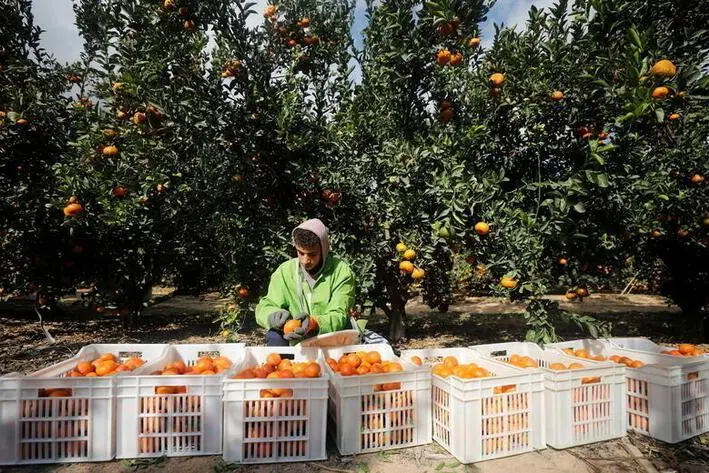PHOTO
Egypt’s Minister of Agriculture and Land Reclamation, Alaa Farouk, met with the supervisory mission of the International Fund for Agricultural Development (IFAD) to discuss efforts to develop desert environments in the Matrouh governorate. The meeting was chaired by Mohamed Abdelgadir, IFAD’s Country Programme Manager for the Near East, North Africa and Europe.
Farouk emphasised the importance of expanding agricultural development to all parts of Egypt, especially border regions, as part of the government’s “Decent Life” initiative. He said the government was focused on improving the livelihoods of residents in these areas, enhancing their skills and achieving sustainable agricultural development.
He highlighted the need to address the negative impacts of climate change and desertification, focusing on building rainwater harvesting facilities, such as “Nashua” wells and underground tanks, as well as rehabilitating old Roman wells.
“We must focus on developing valley bottoms and utilising floodwater in agriculture through the construction of dams, improving natural pastures and livestock resources, particularly sheep and goats that rely on grazing, as well as developing the skills of women in Sinai and supporting their activities,” he said.
Farouk said the “Promoting Resilience in Arid Environments” (PRIDE) project, which covers rain-fed agricultural areas stretching from west of Dabaa, south of Ras El Hekma, Marsa Matrouh and Al-Najila to Sidi Barrani and Salloum, as well as Siwa and Al-Maghara, was crucial for improving the lives of citizens, enhancing their capabilities, and increasing agricultural productivity through the optimal utilisation of natural resources.
The minister and IFAD delegates reviewed the results of their monitoring of the PRIDE project activities, examining implemented development works and ensuring that beneficiaries were benefiting from the project. The meeting also reviewed the progress made and its impact on improving the production capacities of farmers in the project’s operational areas, spanning from Dabaa and Ras El Hikma to Marsa Matrouh, Al-Najila, Sidi Barrani, and Salloum.
The PRIDE project has implemented approximately 1,600 “Nashua” wells and 400 cisterns for harvesting and storing rainwater to provide water for domestic use and animal watering. The project has also rehabilitated 89 Roman wells and constructed 70 km of secondary and developmental roads to serve Bedouin communities.
Project activities have also included improving social infrastructure by rehabilitating 50 homes for female-headed Bedouin families in need, distributing goats, implementing units and models for developing and protecting natural pastures, establishing demonstration fields for field and orchard crops, and executing various projects to improve the living standards of Bedouin communities in desert areas affected by climate change, desertification, and drought.
© 2024 Daily News Egypt. Provided by SyndiGate Media Inc. (Syndigate.info).





















